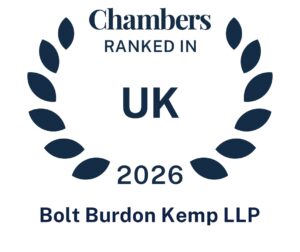
The benefits of early therapeutic intervention for babies affected by Hypoxic-Ischaemic Encephalopathy (H.I.E.)
Many parents feel frightened and overwhelmed when they learn their baby has a hypoxic ischaemic encephalopathy (HIE). Eager to do whatever it takes to ensure their child thrives, parents often research how to support their child to achieve their potential from day one.
There is a lot of information out there about the importance of starting therapy for children with HIE as soon as possible; this is known as ‘early therapeutic intervention’ and is grounded in the idea that the earlier the child receives input, the greater the benefit to their quality of life and long-term prognosis.
Part of my role as a child brain injury solicitor is securing compensation which can be used to privately fund my clients’ lifelong care, therapy and equipment needs. I am often told by my clients’ parents that the reassurance and peace of mind this gives them as parents is immense and cannot be overstated.
Whilst my colleagues and I always strive to secure compensation as early as possible, the litigation process can take several years, and so our clients often rely on NHS services until private funds are available through the claim.
I hope this article helps parents feel more able to seek out therapy and equipment for their child at the earliest possible stage.
What early therapeutic intervention is available through the NHS?
The level of early therapeutic intervention for babies with HIE varies throughout the country. Some trusts, particularly those with specialist facilities to treat brain injuries and premature babies, have dedicated therapists on the neonatal intensive care unit, and special care baby units; but proactive early intervention in the hospital and community is often the exception, not the rule.
Parents can find that after a traumatic delivery, and a period in hospital where their baby has received close medical attention around the clock, they are suddenly discharged into the community with some basic advice and very limited support.
There are often no plans for input from physiotherapy (PT), occupational therapy (OT) and Speech and Language Therapy (SALT), at this early stage and so many parents find themselves alone, unsure of what their child’s therapy needs are and how to meet them.
What education would be useful for parents?
Parents are not therapists – they do not know what they do not know – and to find themselves without support or knowledge at such a crucial time can be a frightening experience.
Even the most confident parents will struggle to advocate for their child if they do not know what they need.
Some examples of what parents may want education around in these early days and months include:
- Advice from PTs on positioning, handling, bathing and dressing a baby who experiences muscle spasms and dystonia;
- Exercises and baby massage routines to reduce discomfort from spasms;
- Advice from SALTs on feeding, secretions and reflux management to ensure their baby is eating enough and safely;
- Guidance on how and when to start promoting head control; and,
- Advice on how to reduce and manage touch, light and movement sensitivities.
As well as practical support, many parents find they need emotional psychological support to help them through the trauma and to prepare them, insofar as possible, for the journey ahead.
What therapy can be useful for babies with HIE?
Often children do not get referred to therapy services until they present as developmentally delayed or have a formal diagnosis of cerebral palsy and by this stage they may be two to three-years-old.
Delaying early therapeutic intervention can lead to missed opportunities and in severe cases, compromise a child’s developmental delay and contribute to avoidable secondary problems.
Therapists can provide a lot of advice and support to parents on their baby’s therapeutic needs from the outset.
Some examples of early intervention include:
Physiotherapy:
- Monitoring baby’s movements to pick up evidence of altered movement patterns, tremors, and involuntary muscle contractions;
- Support with splinting, to help with cannulas;
- Guidance on baby massage;
- Guidance on positioning of the baby, supporting parents with how to manage things like ‘tummy time’ when their baby is attached to tubes or monitors.
Speech and Language Therapy:
- Assessing and monitoring a baby’s swallow so parents can get advice on feeding and developing strategies for avoiding or addressing oral sensitivity in their early weeks and months of life.
Occupational Therapy:
- Educating parents about noise and touch sensitivity. Babies who have spent their early life in the neonatal and baby units are often not used to being touched, or the outside noises of the world, and there are strategies parents can use to address this.
- Recommending simple pieces of equipment which avoid problems later in life, such as a star pillow which keeps the baby’s head in the midline position and prevents shortening of the neck muscles.
If parents are able to secure early therapeutic intervention before their child is formally diagnosed, it can help improve their long-term prognosis and also means they are getting support and guidance about how best to meet their child’s individual needs.
What can parents do?
In my experience, without exception, parents want to give their child the best start to life.
Unfortunately, if a child has sustained a brain injury, the services available through the NHS to support the child and their family can be limited.
I have seen first-hand the transformation that can occur when children have early access to a dedicated multidisciplinary team of therapists, and the correct equipment.
This can range from the help mentioned above in the early days, through to life-changing interventions later on such as giving a child the bespoke equipment they need to help them mobilise independently. It can also include securing opportunities they have not yet had to communicate through alternative communication systems.
Every child with HIE should be given these opportunities.
I would encourage parents who think their child may benefit from early therapeutic intervention to consider the following:
- Speak to your NHS services about what early therapeutic interventions are available in your area. Do not be afraid to push for what you think your child needs;
- If you can afford it, seek input on a private basis from therapeutic services. If your child has a compensation claim these costs can be included in the case;
- Read our CP Advice Hub for Parents which contains a lot of useful information for parents about cerebral palsy;
- Contact charities such as PEEPs to explore what support is available through their channels; and,
- Investigate the support available through the local authority including through Education and Health Care Plans when your child starts nursery (and is over two-years-old).
If you think your child has HIE because of substandard medical care, you should also consider contacting specialist solicitors without delay so you can begin the process of investigating a potential claim. If you’re entitled to compensation this can be used to fund private treatment and equipment for your child and secure funds to meet their lifelong needs. There can be no better peace of mind.
At Bolt Burdon Kemp we are passionate about helping our clients flourish and achieve the best quality of life; helping parents secure early therapeutic intervention is central to this process.









